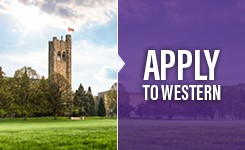First Year
Arts and Humanities 1020E is taught by Research Fellows in the School. In lecture, discussion, and workshop formats, these faculty members will aid you in completing a variety of assignments, which might include traditional academic writing, creative work, and collaborative projects.
Our central purpose in immersing students in interdisciplinary dialogue and debate early on in the Program is to encourage you and enable you to take an active role in the future of the humanities.
The course has several objectives:
- to consider what it means to study “the Humanities” and how the Humanities needs to inform our understanding of our private and public roles. What is it to be human/inhuman, and what are our commitments as humanists?
- to reflect on the diversity of human experience, both current and historical, and the role of the intellectual in the world within the university and beyond it.
Prerequisite: Admission to the School for Advanced Studies in Arts and Humanities 3 hours/week, 1.0 course
Fall 2023
The Public Intellectual: Resistance and Hope
As one of the cornerstones of higher education, intellectualism (and intellectuals), like the Arts and Humanities, seem to be increasingly under attack, often targets of public suspicion. That is to say, there is an increasingly anti-intellectual mood in the air. Whereas previously the university was a bastion of intellectual work separate from outside response or influence, increasingly we’re called upon to make our research public, to be public intellectuals. But this role goes back at least to Emile Zola’s letter to the President of France in response to the Dreyfus Affair, “J’Accuse . . . !”, even to Socrates, who was sentenced to death for refusing to renounce his beliefs. Investigating the past, present, and future roles of the public intellectual, this course thus urges you to ask as you begin your time in SASAH, and in university in general: What does it mean to be an intellectual in the twenty-first century? Does, can, or should what we do in the classroom and in our research have a more direct public impact? If so, what is the role of the Arts and Humanities in making this impact? Above all, what is your role and responsibility as a public intellectual, whether as a student or elsewhere in your lives, especially at a time when hope for the future seems more necessary than ever? In the process of asking these questions, we’ll look at a variety of historical and contemporary examples and definitions of the public intellectual, and charge you with exploring answers through a variety of assignments both critical and creative.
Winter 2024
This section of the course is structured around the question: How do we define our present moment and its relation to the recent past? What terms and concepts do we deploy in an effort to make sense of the times we inhabit and the cultural production that defines them? What is included in periodizing labels or explanatory frameworks and, also, what is excluded from their purview? More specifically, what are the benefits and limitations of designations like postmodernity, supermodernity, metamodernism, and digimodernism to name a few that we will subject to critical evaluation in this class.






